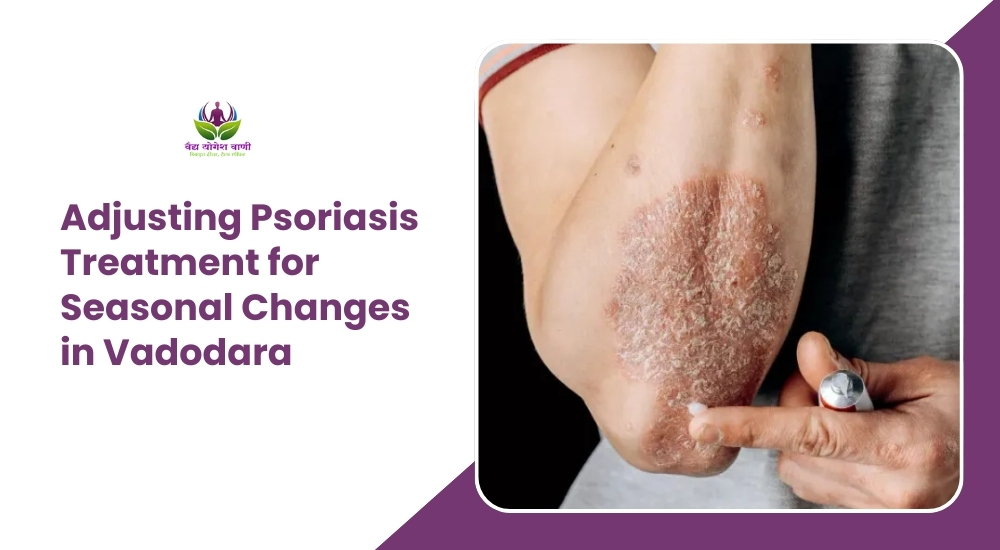Table of Contents
TogglePsoriasis is an immune-related skin condition that produces red, flaky patches, sometimes painful on the skin. It occurs when the immune system mistakenly attacks the healthy cells of the skin, which accelerates the growth of the cells. The result is the excess skin cells, which make the patches visible. This is a chronic condition and does not last for a very long time; it just requires proper treatment.
Being from Vadodara, where the summer can be really hot and winter relatively cooler, you could experience the changing symptoms of your psoriasis during different seasons. This blog will help understand how the change in seasons will affect psoriasis and its management through treatment.
How Seasons Affect Psoriasis Treatment
The symptoms of psoriasis differ with the seasons. Here is how various weather conditions can affect your psoriasis:
Summer (Hot and Dry Weather)
- Increased sweating can cause irritation and itching on the plaques of psoriasis.
- Dehydration occurs during hot weather, and it causes dryness to your skin, which can exacerbate the condition of psoriasis.
- Sun exposure may be useful as UV rays reduce inflammation and slow the rapid turnover of skin cells that cause psoriasis. However, too much sun exposure causes sunburn, and sunburn can cause flare-ups.
Winter (Cold and Dry Weather)
- Cold weather may cause your skin to become itchy and flaky which leads to flare-ups from psoriasis.
- Low moisture levels in winter cause dehydration; the symptoms worsen.
- The indoor heating also dries up the air, which will strip off moisture from your skin, aggravating psoriasis.
Monsoon (Rainy Season)
- The high humidity of the monsoon season sometimes offers relief as it keeps the skin moistened.
- However, increased chances of fungal infections from dampness can sometimes trigger flare-ups, particularly if your skin is already irritated.
Why Adjusting Your Treatment Plan is Important
Treatments for psoriasis can’t be one-size-fits-all. What works well in one season may not work well in another season. Here are some tips to adjust your treatment for psoriasis in Vadodara:
Adjusting Skincare Routine
In Summer
- Hydrate your skin: In the summer, your skin dries out fast. Choose a good moisturizer that locks in moisture without clogging pores. Some products contain ingredients like glycerin, hyaluronic acid, and ceramides.
- Use cooling treatments: Aloe vera gel, cucumber, or mint-based lotions can calm down the skin.
- Take a shower wisely: Avoid using hot showers, as this removes the natural oils in the skin. Instead, take lukewarm water and use mild soap or body wash. Gently pat your skin with a soft towel to avoid irritation.

In Winter
- Moisturize regularly: Dry air in winter aggravates psoriasis. Use thicker oil-based moisturizers to protect the skin. Immediately after bathing apply moisturizers in order to hold the moisture in the skin.
- Use humidifier: If indoor air is very dry, make use of humidifiers by adding moisture to the air. It can prevent dryness on your skin.
- Avoid hot, lengthy showers: Long, hot showers dry out your skin. Instead, take short and cool showers.
In Monsoon
- Keep your skin clean: Because of high humidity, sweat, and moisture may be the cause of a fungal infection that worsens psoriasis. Keep your skin clean and dry.
- Keep cool: Avoid sweating as it will irritate your psoriasis.
Managing Stress
Stress can also precipitate psoriasis. So, in all the seasons, try to incorporate relaxation practices in your daily routine, such as yoga, meditation, and breathing exercises. These will help improve your well-being and help handle stress.
Consultation with a Dermatologist
If your psoriasis symptoms change with the seasons. It’s very important to visit a dermatologist so that he can work out a customized treatment plan for you based on your skin needs during the year.
Diet and Lifestyle Adjustments
Diet plays an important role in the management of psoriasis. Some foods may trigger flare-ups, and there are others that may reduce inflammation. Here’s how you can adjust your diet for each season:
- In Summer: Focus on rehydrating with plenty amounts of water, coconut water, and fresh fruit juices, and avoid processed foods that make one inflamed.
- In Winter: Include warm, anti-inflammatory foods such as soups, broths, and herbal teas to promote healthy skin. Omega-3-rich foods like fish, walnuts, and flaxseeds reduce inflammation.
- In Monsoon: Keep your immune system strong by consuming antioxidant-rich foods such as berries, green leafy vegetables, and nuts.
Conclusion
Psoriasis, a chronic condition, is said to be influenced by fluctuations in the weather. By adapting to the seasons and changing your approach to treatment for Psoriasis in Vadodara, you can well manage your symptoms and gain a better quality of life. Whether it is using suitable moisturizers during winter, not sweating too much during the summer, or keeping cool while the monsoon is on its way, these small changes help a lot.
Frequently Asked Questions
Keep yourself hydrated, use light moisturizers on your skin, and avoid long sun exposure.
The cold, dry air of winter can dry your skin, causing a flare-up of psoriasis. Oil-based moisturizers and a humidifier can help to keep your skin moist.
Yes, coconut oil, aloe vera, and turmeric are some of the most commonly used herbal remedies for psoriasis that can reduce inflammation and moisturize your skin.
When symptoms worsen or do not improve with self-care, it is time to see a dermatologist and readjust your treatment plan.



